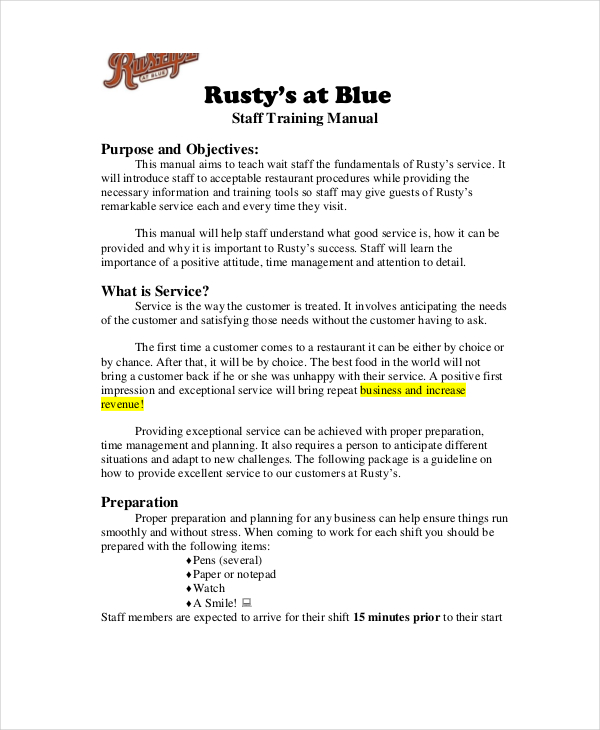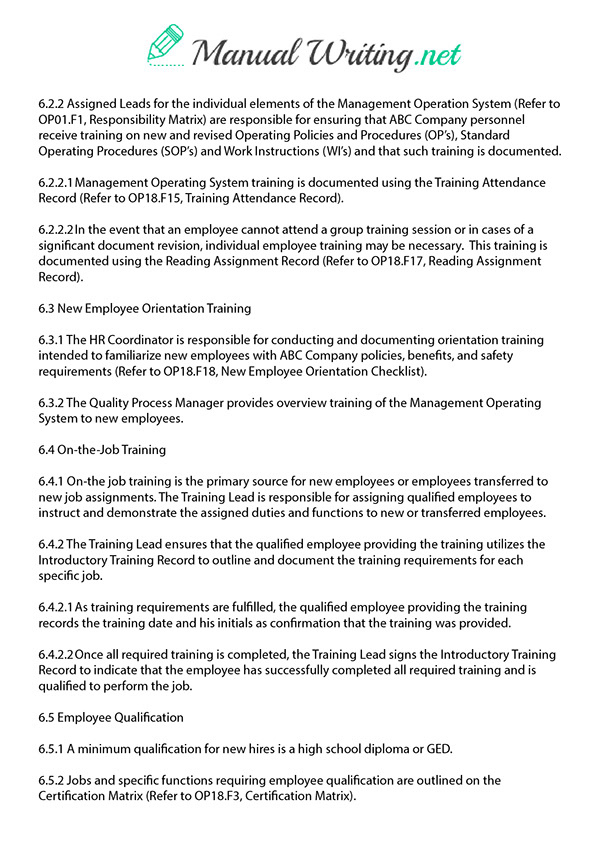

How to write a training manual. Creating a great training manual can be intimidating, but it doesn’t have to be. With the right approach, you can quickly go from outline to production, and provide your co-workers or customers, whomever your audience may be, with a helpful, easy to use resource. Training manuals play a critical role in employee training by teaching new employees about a company and its processes. Existing employees grow and learn about new systems, tools, or software. Employees who are not constantly learning or new hires who are not familiar with the tools, apps, software, or machinery used by their company can become. The manual helps your stand-ins do what needs to be done, and it also brings you peace of mind because you’ll know your work is covered, and also covered correctly; you wrote the manual, after all! If you need to onboard a new employee, then you can provide the new recruit with copies of the manual. A training manual can serve various purposes such as a training handbook for new employees, a review of safety policies, a demonstration of emergency plans, an orientation program of newly implemented regulations, or steps in dealing with customer service. Essentially, establishing your goals gives you the entire idea of the kind of training.

- Products
Overview
For Dynamic Workforce Scheduling
- ScheduleFlex
For High Compliance Scheduling
- SchedulePro
Latest Updates: How Workforce Technology Can Help During the COVID-19 Crisis Learn More
- Why Shiftboard
Latest Updates
How Workforce Technology Can Help During the COVID-19 Crisis
Value of Shiftboard
Company
- Solutions
Solve Your
Business ChallengesScheduling
for Your Industry- Manufacturing
- Healthcare
Latest Updates: Workforce Scheduling Resources to Help You During the COVID-19 Crisis Learn More
- Resources
Employee Scheduling
Workforce Management
General Resources
Customer Spotlight: SIFF
Before implementing event staff scheduling software, the Seattle International Film Festival (SIFF) sketched out their complex schedules on whiteboards. This manual method was not scalable and was prone to human error. SIFF transformed their event planning process by implementing scheduling software, which streamlined the process for event coordinators while empowering staff and volunteers to schedule their own shifts.
Customer Spotlight: Maker Faire
Maker Faire draws more than a half million people over a two-week period. Orchestrating this massive event involves filling 950 shifts with 4,000 volunteers. Previously, Maker Faire organizers relied on spreadsheets for scheduling, but Shiftboard enables them to quickly and easily upload 200 shifts to the calendar, putting them two weeks ahead in their planning schedule. Shiftboard also enables them to split their workforce into teams, get the right updates to the right people, and easily manage and communicate event details like schedules, transportation, and meals.
- Products
Overview
For Dynamic Workforce Scheduling
- ScheduleFlex
For High Compliance Scheduling
- SchedulePro
Latest Updates: How Workforce Technology Can Help During the COVID-19 Crisis Learn More
- Why Shiftboard
Latest Updates
How Workforce Technology Can Help During the COVID-19 Crisis
Value of Shiftboard
Company
- Solutions
Solve Your
Business ChallengesScheduling
for Your Industry- Manufacturing
- Healthcare
Latest Updates: Workforce Scheduling Resources to Help You During the COVID-19 Crisis Learn More
- Resources
Employee Scheduling
Workforce Management
General Resources
Customer Spotlight: SIFF

Before implementing event staff scheduling software, the Seattle International Film Festival (SIFF) sketched out their complex schedules on whiteboards. This manual method was not scalable and was prone to human error. SIFF transformed their event planning process by implementing scheduling software, which streamlined the process for event coordinators while empowering staff and volunteers to schedule their own shifts.
Customer Spotlight: Maker Faire

Employee Training Manual Template
Maker Faire draws more than a half million people over a two-week period. Orchestrating this massive event involves filling 950 shifts with 4,000 volunteers. Previously, Maker Faire organizers relied on spreadsheets for scheduling, but Shiftboard enables them to quickly and easily upload 200 shifts to the calendar, putting them two weeks ahead in their planning schedule. Shiftboard also enables them to split their workforce into teams, get the right updates to the right people, and easily manage and communicate event details like schedules, transportation, and meals.